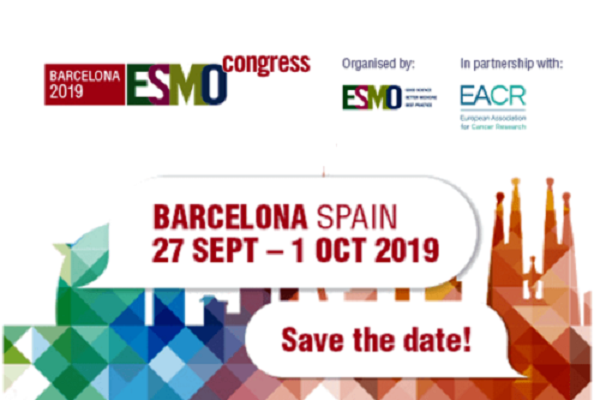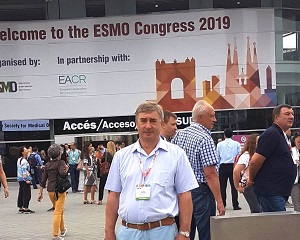ESMO 2019 - the annual meeting of the European Society of Medical Oncology - European Society of Oncologists-Chemotherapists was held in Barcelona (Spain), September 27-October 01, 2019. Associate Professor Olga Ponomaryova and Professor Bogdan Sorokin, the staff members of the Oncology Department in the Shupyk NMAPE, took part in this event.

Leading scientists from European and global scientific community have dedicated their reports to modern algorithms for the diagnosis and treatment of malignancies of different locations. Changes in the therapeutic scenario over the past 15 years have highlighted the need for a multidisciplinary approach to treatment and improving targeting of the malignancies. Very interesting information was provided on new options for the treatment of the mammary gland cancer with its newest targeting.
The data from phase III of the POLO trial were presented by AstraZeneca and Merck and showed that olaparib, a PARP inhibitor, demonstrated a statistically proved and clinically significant progression-free survival (PFS) as the first line of the single agent therapy in patients with BRCA-mutated (gBRCAm) metastatic adenocarcinoma, who did not respond to platinum-based chemotherapy. Olaparib reduced the risk of the disease progression by 47% compared to placebo. The median PFS in the olaparib patients was 7.4 months, compared to 3.8 months for patients receiving placebo. The speakers of the event stated that more than twice as many patients remained free from progression in one year, 34% to 15% and in two years - 22% versus 10%, respectively.
In a Phase III MONALEESA-7 study, ribocyclib in combination with endocrine therapy extended the life of women with the human epidermal growth factor receptor-2 to negative (HR + / HER2-) advanced or metastatic breast cancer. It was recognized that overall survival (OS) in the 42-month treatment population was 70.2% for combination therapy with ribocyclib compared to 46% - for the endocrine therapy alone. At the time of data disconnection, 35% of the women, receiving combination therapy with ribocyclib, have continued the treatment. The results of the subgroup analysis of the ribocyclib + aromatase inhibitor efficacy showed a 30% reduction in the risk of death compared with the aromatase inhibitor. Ribocyclib + tamoxifen showed a reduced risk of the death occurrence by 20.9% compared to tamoxifen.
During the interim analysis of the MONARCH 3 study, abemaciclib + non-steroidal aromatase inhibitor (AI), significantly improved a progression-free survival (PFS) and objective response (ORR) with a valid safety profile as initial treatment for advanced breast cancer with positive receptor expression. negative expression of the type 2 epidermal growth factor receptor. Patients, receiving abemacyclib, had significantly higher mean PFS than those receiving placebo. The response to treatment was 61.0% in the abemacyclib group versus 45.5% in the placebo group. The mean duration of response was longer in the abemacyclib group (27.39 months) compared with placebo (17.46 months). The security profile was satisfactory. Abemaciclib + non-steroidal aromatase inhibitor has proven to be an effective initial treatment with an acceptable safety profile for the HR +, HER2- breast cancer.
Each new achievement in the field of clinical oncology means many saved lives and the support for optimistic outlook.